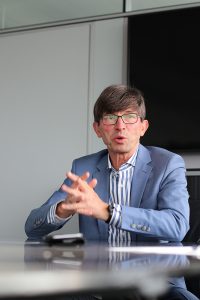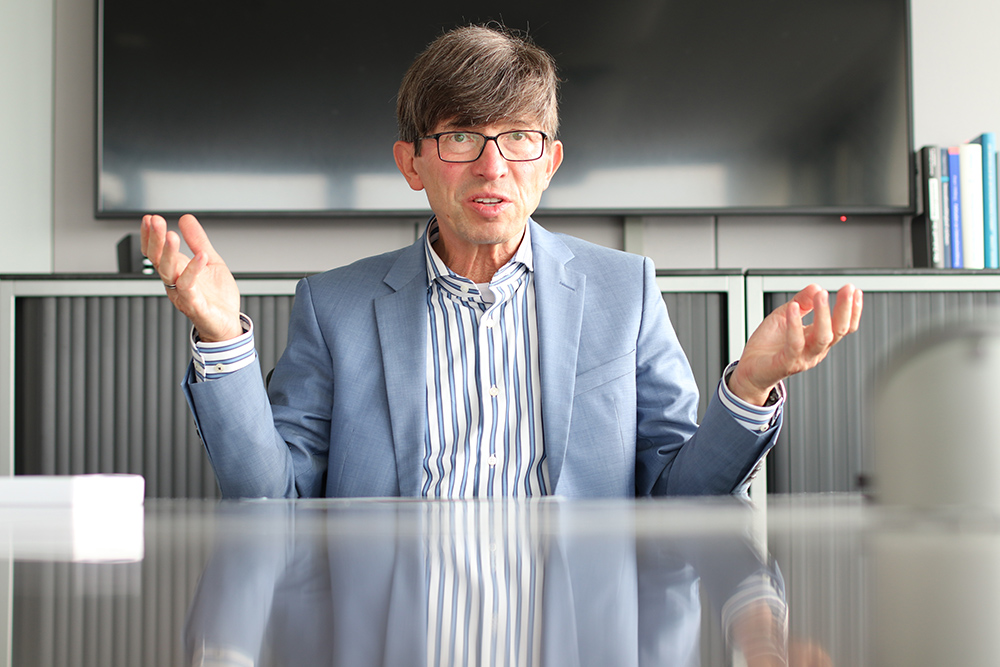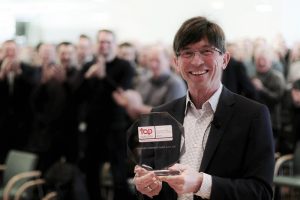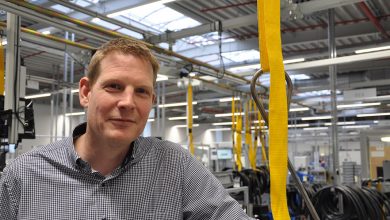In this interview, General Manager Professor Dr. Gunther Olesch reveals why he attaches particular importance to skilled work, the importance of the Phoenix Contact brand when choosing a career, and how he makes Blomberg attractive on the job market.

Professor Dr. Olesch has been with Phoenix Contact since 1989. Since 2001, the business psychology graduate has been one of four managing directors and is responsible, among other things, for personnel and training. For many years he has been a lecturer at the Ostwestfalen-Lippe University of Applied Sciences, as well as Chairman of the Lippe Employers’ Association and Chairman of the Initiative for Employment OWL. Within the National Platform for Electric Mobility, Gunther Olesch is a member of the steering committee and chairs the working group “Education and Qualification”.
UPDATE: Professor Dr. Olesch, how important are “skilled hands” at Phoenix Contact, the digital company?
Extremely important. Just think of all the machines we have in production. They not only have to be designed, but also assembled, set up, maintained, and, in daily operation, fed with the intended raw materials or semi-finished products. We need not just engineers for this, but also hands-on specialists. Even maintenance and building technology – this is not yet possible with 3D printing. Of course, we are a digital industrial company, but skilled hands are and will remain decisive.

UPDATE: And how important are the craft trades, that is to say professions without an academic background, in the modern industrial landscape of the future?
Perhaps even more important than years ago. There are not enough skilled workers. And this will have an even greater impact in the future. While we have been pushing dual studies in the last ten years because there were not enough engineers, we are now increasing our commitment to skilled workers and their classic training. Otherwise, we will not have them in the future. There will be enough engineers, but not enough skilled workers to maintain, repair, and service the machines, to replace motors and bearings. We are already feeling this, and if we do not act, it will worsen dramatically.
UPDATE: A development that could be seen coming a long time ago. How long have you been responsible for the personnel structure at Phoenix Contact?

I have been with the company for 31 years and have been on the Management Board since 2001. Here, I am responsible for the field of human resources, but also for those of IT and facility management, among others. Training has always been my mission. And that is to say, training at the highest level.
UPDATE: Was that one of the reasons for founding the Training Center? How important is training our own young talent?
It is existential for us. One reason is our rural location, where it is difficult to find mechatronic engineers on the open labor market. Both training and continuing education are extremely important, which is why we have built the spacious training and continuing education center at the Schieder site. The job profiles of skilled workers have also changed dramatically, and there cannot be a stagnation of theory and practice. These need continual training.
Think, for example, of the lathes on which people performed mainly manual work 20 years ago. Today, in the age of increasing digitalization, computers must be operated skillfully. But if something goes wrong, for example if a gearbox has to be changed, then it still comes down to skilled hands. We have to accommodate for this. And this is what we teach in our ultra-modern training workshop.

UPDATE: The baby boomer generation are today looking almost enviously at the coming generations, because while everything was scarce for those born before 1969 – school, training, studies, professions – future graduates can practically choose their jobs. How are you responding to this demographic change, the increasingly noticeable shortage of young people?
We were already aware of this upcoming demographic change – the retirement of the baby boomer generation from active working life – 20 years ago. It is only now that it is becoming more and more visible to the public. But the current shortage of skilled workers is still nothing to worry about yet. From 2000 to today, 2020, we have seen a drop in skilled workers of around seven percent. By 2030, this will be 20 percent. And then, those born in the 1960s, the years with the most births, will retire. The contraceptive pill was introduced in the late 1960s; before then, an average German family had 3.8 children, and after that there were just 1.2 children per family. This will not be a slow, analogous change. The lack of skilled workers will be dramatic; it will be a digital demolition.
We are not Microsoft
And we are also not Microsoft or Porsche or BMW, and we are not based in major cities such as Munich or Stuttgart. Our products are concealed within machines and equipment, so end consumers will never be impressed if we change colors or develop a bold design. We do not even have a presence in hardware stores. And on top of this, our headquarters are in Blomberg, for example. The “World Metropolis”, Blomberg.

We know all of this, and have for a long time. So what can we do? We have to make a name for ourselves as being a very good employer. Since 1994, we have also been working to build our reputation in this field as well. At the beginning, I was ridiculed by everybody because of my commitment to this. Top Job, Best Place to Work, Kununu – we are now regarded as a top employer far beyond our national borders. We have built up a true brand name in our target groups, regardless of how well known our products are. It has been a long journey. But it was worth it.

In the last 20 years, we have been Germany’s best employer 11 times, achieved second place nine times, and reached third place six times. In terms of key figures such as page views, satisfaction levels, and staff turnover, we are in the top group – ahead of industry giants such as Microsoft and Siemens
Today, 82 to 84 percent of all applicants decide to make an application, among other reasons, because they obtain information from the job evaluation portal Kununu, for example. This figure includes apprentices and skilled workers, not just academics. And we are simply perceived by the outside world as an attractive employer. This is how we are securing the attention of our potential young talent.
UPDATE: How are our employees structured, especially our future employees?
In terms of gender, I still see a big challenge, and this has been the case for more than 20 years. No one is forbidding women from taking up engineering professions, but despite all our efforts, the proportion of women in engineering professions is just five percent. In medical professions, for example, the picture is completely different, with more than 75 percent of all students being female. This is a situation that only exists in Germany. I also teach international students at the university. In the case of Indians, Pakistanis, and the Chinese, the sexes are represented approximately equally. Here in Germany, we still have to do a great deal of persuading in the technical professions. We are trying to garner interest early on, at school level. At first, the female pupils are quite taken with the idea. But later, they decide to become medical assistants or hairdressers or go into the commercial sector. Around 10 years ago, 18 percent of people working in technical professions were women, but this has been declining again for some years now.
And this is despite the fact that technically trained staff have a much better future. Commercial fields are constantly being streamlined by software, with the PC taking over more and more of the work. But, of course, we cannot force anyone to work for us. Incidentally, this is not just the case for academic careers, but also for skilled workers. I would like to see a 50: 50 distribution between genders.

UPDATE: Young talent at Phoenix Contact – which trainees are “the best”, and which ones are you wary of?
I love those new employees who tell me that their training was merely the entrance ticket to the theater performance that is the professional world. That they want to create something new, like Steve Jobs or Elon Musk or Bill Gates. Those who set themselves a vision for their own life, and go on to pursue it. Those who say they just want to do their job, otherwise they want to be left alone – they are the ones I am wary of.
UPDATE: Are we taking skilled workers away from the trades? How does Phoenix Contact get along with the trade companies around us that provide training?
I am also the vice president of the Chamber of Commerce and Industry, so I have to deal with this issue all the time. I have to say that a large number of skilled workers are responsible for this themselves to a large extent. Anyone who needs skilled workers must also be prepared to train them.
UPDATE: But isn’t craftsmanship considered the training machine of small to medium-sized enterprises?
It used to be. That has not been the case for a long time. If it was said here in East Westphalia that there was a lack of training places, then in recent years this was often in the craft trade sector. We have always trained very intensively, with up to 400 apprentices and trainees at the same time. If the craft trade sector lacks skilled workers, it is often because they have not recruited the next generation themselves.
Let’s not kid ourselves: It is not money or working hours that always have to be used as an argument when it comes to competing for talent. Those who are satisfied in the craft trade will stay there. But if they are not happy, they leave. Many start in a company because of the money and stay or leave because of their supervisor.
Across Germany, the turnover in staff is around 11 percent. The turnover here is a mere one percent. There is a great deal more to this than just making a quick buck. Above all else, it is because of our corporate culture. If your heart lies with a company, you don’t leave.
More about craftmenship at Phoenix Contact
Inspiring tomorrows engineers
Craftmenship at the abyss



